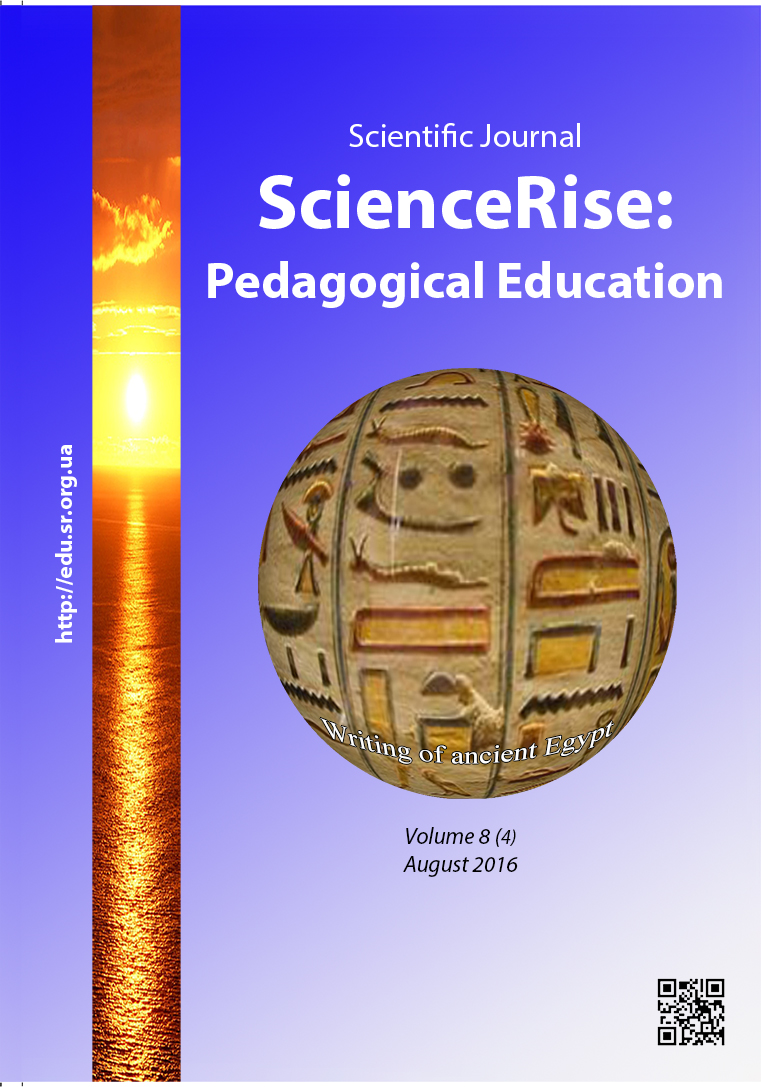Лідерствоу контексті еволюції підходів до осмислення феномену в освіті
DOI:
https://doi.org/10.15587/2519-4984.2016.76221Ключові слова:
лідерство, лідер, особистісно орієнтоване лідерство, процесно орієнтоване лідерство, заклад освітиАнотація
У статті визначаються напрями еволюції підходів до розуміння сутності та змісту лідерства у ХХ–ХХІ ст. Акцентується увага як на особистісно орієнтованому підході до осмислення феномену лідерства, відповідно до якогофокус дослідження спрямовується на вивчення особистісних якостей, навичок керівника, його ролі у закладі освіти, поведінки, стилю управління, так іна процесно орієнтованому підході до розуміння сутності лідерства, у контексті якого воно визначається як процес та як результат міжособистісних взаємодій, а не діяльності однієї особи
Посилання
- Rost, J. (1993). Leadership for the Twenty-first Century. Greenwood Publishing Group, 220.
- Project Law of Ukraine “About Education” (2016). Verhovna Rada Ukrai'ny, 974-VIII. Available at: http://w1.c1.rada.gov.ua/pls/zweb2/webproc4_1?pf3511=57141
- Project Concept of Education Development for the period 2015–2025 years. Ministerstvo osvity i nauky Ukrai'ny. Available at: http://old.mon.gov.ua/ua/pr-viddil/1312/1390288033/1414672797/
- Bass, B. (2008). The Bass Handbook of Leadership: Theory, Research, and Managerial Applications. Free Press, 1536.
- Ashby, M. D., Miles, S. A. (Eds.) (2002). Leaders Talk Leadership: Top Executives Speak Their Minds. NY: Oxford University Press, Inc., 257.
- Hunter, J. (1998). The Servant: a Simple Story About the True Essence of Leadership. Roseville, California: Prima Publishing, 189.
- Tichy, N. (2002). The Cycle of Leadership. How Great Leaders Teach Their Companies to Win. Harper Collins e-books, 464.
- Eliot, J., Saimon, W. (2012). Steve Jobs: uroki liderstva [Steve Jobs: Leadership Lessons]. Мoscow: Eksmo, 336.
- Ulrich, D., Smallwood, N. (2013). Leadership Sustainability: Seven Disciplines to Achieve the Changes Great Leaders Know They Must Make. McGraw-Hill Education, 288.
- Avery, G. (2011). Understanding Leadership, Paradigmsand Cases. SAGE Publications Ltd., 300. doi: 10.4135/9781446215487
- Yevtichov, O. V. (2007). Strategii I priemy liderstva: teorii I praktika [Strategies and Leadership Methods: Theory and Practice].Sankt-Petersburg: Rech, 238.
- Kalashnikova, S. (2010). Osvitnia paradygma professionalizaciyi upravlinnia na zasadah liderstva [Educational Paradigm of Professionalization of Management on the Basis of Leadership]. Kyiv: Borys Grinchenko Kyiv University, 380.
- Yukl, G. (1989). Managerial Leadership: A Review of Theory and Research. Journal of Management, 15 (2), 251–289. doi: 10.1177/014920638901500207
- Foskett, N., Lumby, J. (2003). Leadingand Managing Education: International Dimensions. London: Paul Chapman Publishing, 240. doi: 10.4135/9781446221013
- Sheppard, B. (1996). Exploring the Transformational Nature of Instructional Leadership. Alberta Journal of Educational Research, XLII (4), 325–344.
- Caldwell, B. J., Spinks, J. M. (2013). The Self-TransformingSchool. UK: Routledge, 232.
- Saleh, I. M., Swe Khine, M. (2014). Reframing Transformational Leadership: New School Culture and Effectiveness. Rotterdam: Sense Publishers, 120.
- Nigel, B., Lesley, A. (Eds.) (2003). Rethinking Educational Leadership Challenging the Conventions. London: SAGE Publications, 206.
- English, F. W. (2003). The challenge of postmodernism to the theory and practice of educational administration. Springfield: Charles C Thomas Publisher, LTD., 292.
- Giancola, J. M., Hutchison, J. K. (2005). Transforming the culture of school leadership: Humanizingourpractice. Corwin Press, 224.
- Harris, A. (2008). Distributed School Leadership: Developing Tomorrow's Leaders. UK: Routledge, 192.
- Wallace, R. (2009). The Servant Leader and High School Change: More Lessons from Principal to Principal. Rowman Littlefield Education, 104.
- Day, D. V., Antonakis, J. (Eds.) (2012). Thenature of leadership. SAGE Publications, 608.
- Northouse, P. G. (2015). Introduction to Leadership: Conceptsand Practice. SAGE Publications, Inc., 352.
- Yukl, G. (2010). LeadershipinOrganizations. Pearson, 644.
- Asghar, R. Ranking The 9 Toughest Leadership Roles. Forbes. Available at: http://www.forbes.com/sites/robasghar/2014/02/25/ranking-the-9-toughest-leadership-roles/
- Western, S.; Preedy, M., Bennettand, N., Wise, C. (Eds.) (2012). An Overview of the Leadership Discourses. Educational Leadership: Context, Strategy and Collaboration. SAGE Publications, 23–35.
- School leader ship: concepts and evidence (2003). National College for School Leadership, 42. Avaialble at: http://dera.ioe.ac.uk/5119/14/dok217-eng-School_Leadership_Concepts_and_Evidence_Redacted.pdf
- Lynch, M. (2012). A Guideto Effective School Leadership Theories. NY: Routledge, 232.
- Gardner, J. (2013). The Nature of Leadership. The Jossey-Bass Readeron Educational Leadership. San Francisco: Jossey-Bass A WileyBrand, 39–47.
- Boyett, J.,Boyett, J. (2009). Putevoditel po tsarstvu mudrosti: luchshye idei masterov upravleniya [The Guru Guide: The Best Ideas of the Top Management Thinkers]. Мoscow: ZAO «Olimp-Biznes», 416.
- Leithwood, K., Jantzi, D., Steinbach, R. (1999). Changing Leadership for Changing Times. Buckingham: Open University Press, 266.
- Bush, T. (2011). Theories of Educational Leadership and Management. London: SAGE Publications, Inc., 232.
- Lambert, L. (2002). A Frame work for Shared Leadership. Educational Leadership: Beyond Instructional Leadership, 59 (8), 37–40. Available at: http://www.ascd.org/publications/educational-leadership/may02/vol59/num08/A-Framework-for-Shared-Leadership.aspx
- Brendon, B. (2009). The Student Leadership Guide. Morgan James Publishing, 284.
- Lynov, К. (2015). Pidgotovka kerivnyka zakladu serednoyi osvity v universytetah Ukrayiny na zasadah liderstva [Training of Secondary Education Principals on the Basis of Leadership]. Vyshcha osvita Ukrayiny: Teoretychnyi ta naukovo-metodychnyi chasopys, 3, 128–132.
- Bolden, R., Petrov, G., Gosling, J. (2008). Tensions in Higher Education Leadership: Towards a Multi-Level Model of Leadership Practice. Higher Education Quarterly, 62 (4), 358–376. doi: 10.1111/j.1468-2273.2008.00398.x
##submission.downloads##
Опубліковано
Як цитувати
Номер
Розділ
Ліцензія
Авторське право (c) 2016 Костянтин Олександрович Линьов

Ця робота ліцензується відповідно до Creative Commons Attribution 4.0 International License.
Наше видання використовує положення про авторські права Creative Commons CC BY для журналів відкритого доступу.
Автори, які публікуються у цьому журналі, погоджуються з наступними умовами:
1. Автори залишають за собою право на авторство своєї роботи та передають журналу право першої публікації цієї роботи на умовах ліцензії Creative Commons CC BY, котра дозволяє іншим особам вільно розповсюджувати опубліковану роботу з обов'язковим посиланням на авторів оригінальної роботи та першу публікацію роботи у цьому журналі.
2. Автори мають право укладати самостійні додаткові угоди щодо неексклюзивного розповсюдження роботи у тому вигляді, в якому вона була опублікована цим журналом (наприклад, розміщувати роботу в електронному сховищі установи або публікувати у складі монографії), за умови збереження посилання на першу публікацію роботи у цьому журналі.









